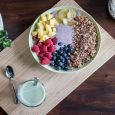Caffeine addicts have a love-hate relationship with caffeine-free teas. Some will drink water until morning when they can drink a mug of strongly caffeinated tea. Others consider certain caffeine-free herbal teas to be a reasonable substitute.
Many people swear by caffeine-free green tea and caffeine-free chai tea. But we’ve chosen a group of other caffeine-free herbal teas that we like.

The following are caffeine-free herbal teas are ones we think you might like, too, especially since, in one way or another, each of these “nighttime teas” will soothe you into a deep and refreshing sleep.
Chamomile
Chamomile tea is the classic “remedy for everything” tea. We were thrilled to see that some of the benefits listed for chamomile tea are conducive to sleep: digestion, blood sugar control, and even straight-up good sleeping.
Peppermint
The list of benefits for peppermint tea is even longer, with twelve items. It includes digestive benefits (even more potent than chamomile), relief for various headaches, and easing of menstrual cramps.
Citrus Lavender
Teavana, the company that produces this caffeine-free herbal tea, describes it as “sweet orange, apple and pineapple zest … balanced by soothing lavender, chamomile and a savory finish with notes of sage.”
Yowza! That combination should send you off to dreamland, just thi nking about it!
Honeybush
Honeybush is a mild, slightly sweet, and caffeine-free tea from a bush grown on the Eastern Cape of South Africa. The leaves and stems are fermented to produce the tea. Honeybush offers some excellent health benefits.
Among them, honeybush is known to reduce blood sugar in diabetics, so we’re sure it will ease the sleep of a good number of people.
Rooibos
No caffeine-free chai tea for us this evening (though we don’t dislike its flavor). Rooibos tea is our pick for the best caffeine-free tea.
Rooibos, also from South Africa, is a close cousin to honeybush. Its flavor is a bit more noticeable, though. Rooibos is a red tea, that some say has a slight root beer-like flavor—enough so that it’s sometimes mixed with root beer in cafés.
And rooibos might turn out to be one of the all-time best nighttime teas.
A study at South Africa’s Stellenbosch University found that two compounds in rooibos interfere with the production of cortisol, a stress hormone. The lower the body’s cortisol levels, the greater the likelihood of enjoying uninterrupted sleep.
Other Sleep Aids
Of course, drinking caffeine-free teas is not the only way to fall asleep and sleep soundly. Specific relaxation techniques help some people. Others, when they finally turn off their devices, are out like a light.
To preview some sleep technologies that have helped many people read this article on the Difference Between CPAP and BiPAP Machines. Let us know what you think!
Caffeine-Free Teas? We Say Caffeine-Free Zzzees
Now that our beloved rooibos has been validated as an excellent caffeine-free herbal tea for sleeping, we’re going to put our other caffeine-free teas aside and have a good gulp of that beautiful red liquid that comes from the other side of the world.
Sleep well, friends. And keep your eyes on our website for an exciting and eclectic array of articles about, well, pretty much everything.




